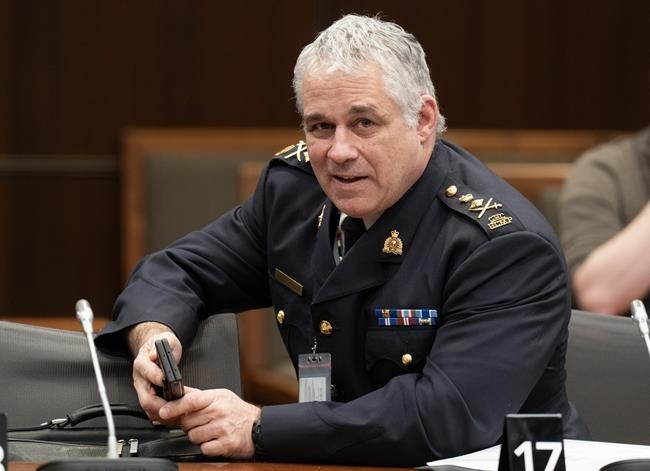OTTAWA — Justice Minister Arif Virani tried to play down suggestions Tuesday that a proposed new sabotage offence would allow authorities to stifle dissent by dismantling rail blockades or breaking up pipeline protests.
The sabotage provision, part of a bill to counter foreign interference, focuses on conduct directed at essential infrastructure such as systems that enable transportation or communications, or support delivery of health and food services.
The government says the offence would not apply to legitimate advocacy, protest or dissent if there is no intent to cause the serious harms spelled out in the bill.
Virani told reporters the goal is to modernize the decades-old provision to deal with people who endanger Canadians in the act of targeting infrastructure.
"What we're trying to ensure is that protest is empowered, and protest is within the confines of the law," he said. "And when there's an intent to endanger, that's when it crosses the line and potentially result in sabotage."
The legislation, which includes a host of measures to deter, investigate and punish foreign meddling, would amend several key statutes.
The bill tabled Monday would usher in new criminal provisions against deceptive or surreptitious acts, allow for the broader sharing of sensitive information and establish a foreign influence transparency registry.
"My overarching view is that this is piecemeal reform of national security legislation," said Wesley Wark, a senior fellow at the Centre for International Governance Innovation.
Partial changes, rather than a comprehensive overhaul of security legislation, may be the "art of the possible" for a minority government and an overstretched national security and intelligence community, Wark said.
"But I think the government is going to face criticism that it wasn't ambitious enough."
In its latest public report, published Tuesday, the Canadian Security Intelligence Service said major perpetrators of foreign interference and spying in Canada and other western countries include China, Russia, Iran and India.
"In 2023, these states and their intelligence services continued to engage in a variety of hostile foreign interference and espionage activities to advance their objectives and interests."
RCMP Commissioner Mike Duheme said the proposed legislation would equip the national police force with some "good tools" to address foreign interference.
Duheme said in an interview Tuesday he welcomed the prospect of new criminal provisions, stiffer penalties and the influence registry, which would require some individuals acting on behalf of a foreign state to register with the Canadian government.
He also applauded a measure that would allow CSIS to disclose sensitive information more widely to help academic institutions, community groups and industry guard against foreign meddling.
Educating private companies, universities and others about the realities of foreign interference will lead to important discussions, Duheme said.
"If you're always stuck with sensitive information which you can't share, how do you open up a discussion or dialogue with individuals, and people from different walks of life, on foreign interference?" he said. "So I think it's a good thing."
The Business Council of Canada says specific and tangible information from CSIS would give companies a clearer understanding of threats.
However, the information-sharing proposal has also stirred concern among civil society organizations wary that disclosure of information about threats to critical infrastructure will prioritize industrial and commercial interests.
It is encouraging that the legislation stipulates such disclosures to companies or others beyond government be stripped of personal information about individuals, said Tim McSorley of the Ottawa-based International Civil Liberties Monitoring Group, a coalition of dozens of organizations.
However, McSorley would like more details about the "policies and guidelines" that will determine how and when CSIS shares information.
The bill would require individuals and entities involved with a foreign country to register their arrangements and disclose any influence activities concerning political processes in Canada.
Wark questioned Canada's "country-agnostic approach" to the proposed registry, which treats foreign players equally rather than zeroing in on states of particular concern.
"You're creating burdensome requirements for people registering, who may come from allies and may pose no real threats," he said. "And you're certainly creating a very burdensome machinery for the government."
This report by The Canadian Press was first published May 7, 2024.
Jim Bronskill, The Canadian Press



